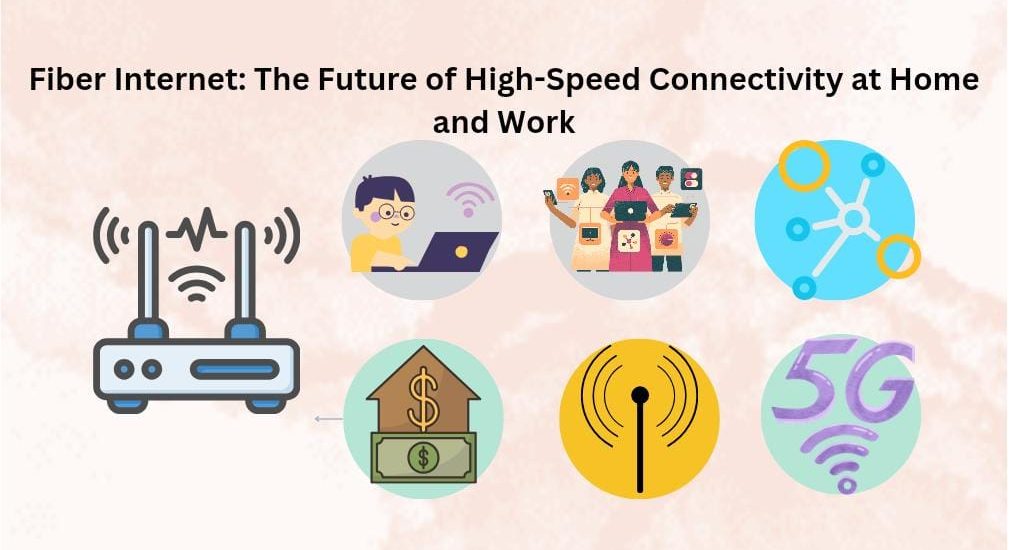Dealing with a slow internet connection is frustrating. But it’s more so when you’re attending an important meeting or working on an important presentation.
Recent research by Engage Employee revealed that about 46% of businesses were annoyed by WAN (Wide Area Network) connectivity issues and could notice a drop in productivity due to the same. Poor internet connection is also limiting home working opportunities. Remote workers with slow internet connections are less likely to increase their home working levels.
Slow internet, however, isn’t the only limitation of traditional broadband solutions. Poor signal strength and outages due to external factors are other limitations.
Fiber internet has emerged as a cutting-edge solution to these challenges. This technology promises to ensure a seamless and uninterrupted connection, free from the frustrations of lag and buffering.
That said, here’s why you must consider installing fiber internet in your residential and commercial settings.
Benefits of Fiber Internet for Home and Business
Here we’ll discuss the advantages of fiber-optic internet, also called fiber-optic internet or simply fiber, for home and business:
1. High Speed
One of the most significant advantages of fiber internet is its fast speed. It can deliver speeds up to 100 gigabits per second (Gbps), though most clock in at around 1 Gbps. However, even at 1 Gbps, it’s faster than the traditional highest-speed copper internet. You can stream video, transfer large files, and conduct other high-intensity tasks quickly, even when multiple devices are connected.
The upload and download speeds of fiber-optic internet are also symmetrical. That means the upload speed is as fast as the download speed. You can download large files or hour-long videos in a matter of minutes without any hassle. This allows for a pleasant internet experience.
2. Ultra-Reliable
Fiber-optic networks are the fastest, but do you know that they are more reliable than other copper-based internet connections?
Copper-based cables are prone to outages. Factors like severe weather conditions, moisture, or interference from radio or electronic signals result in interruptions.
Fiber cables, however, offer unparalleled reliability because they are much stronger than copper. They don’t degrade over time or are susceptible to interference from electrical signals and environmental factors. Fiber cables are highly durable and resistant to such issues. As a result, fiber internet is less prone to signal loss or outages.
Peak traffic hours also don’t affect the performance of fiber. Even when too many people in your neighborhood or home are on the internet, fiber-optic internet won’t slow down. Thus, you can conduct your Zoom meetings or stream videos without interruptions.
3. Cost-Effective
Besides speed and reliability, another advantage of fiber-optic internet is that it’s cost-effective.
There is no denying that the installation charges for fiber are higher than those for traditional copper cables, but monthly plans are low. Even long-term savings are substantial.
Unreliable internet connections can lower your employees’ productivity, which will ultimately affect your business’ bottom line. However, you can tackle this issue with fiber internet, whose connection is ultra-reliable.
Fiber cables are also not affected by weather conditions, moisture, or other external factors, allowing your employees to carry out their day-to-day tasks without interruptions. This will improve your business’ bottom line. WOW! writes that your team will get faster network connections and superior reliability for just a few extra dollars a month.
Fiber-optic internet is also cost-effective for homeowners with diverse connectivity needs. If your family members stream videos regularly, work from home, and send or receive large files, you will experience limitations with cable internet. This will lead to frustrating slowdowns or buffering during peak usage times.
Fiber’s superior bandwidth, however, ensures smooth and uninterrupted online experiences. Many fiber-optic internet plans do not have data caps. You can use as much internet as you want without worrying about exceeding data caps or facing additional charges.
4. Better Signal Strength
The signals of copper and DSL internet connections weaken as you move farther from the main switch, but this isn’t the case with fiber-optic internet.
Extremely thin fiber-optic cables transfer data through fast-traveling pulses of light. There is another layer of glass or “cladding” wrapped around the central fiber. Light bounces off the cable’s walls instead of leaking out at the edges, allowing it to go further without attenuation.
That means even if you’re far from the internet service provider’s central hub, you can still enjoy consistently high-speed internet without experiencing significant drops in signal strength.
To wrap things up, fiber-optic internet, the pinnacle of high-speed connectivity, is poised to revolutionize how we live, work, and interact with the digital world. Due to its fast speed, reliability, better signal strength, and cost-effectiveness, fiber-optic internet is solidifying its position as the preferred choice for high-speed internet access for commercial and residential applications.
Its superior performance ensures seamless streaming of high-definition content, lag-free online gaming experiences, and lightning-quick downloads or uploads. This allows individuals and businesses alike to thrive in an increasingly digital landscape.

